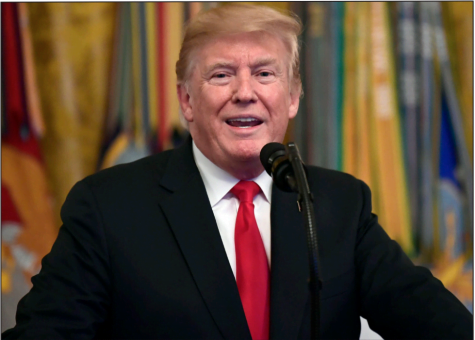Grim Warnings for White House, Republicans ahead of election
Nation & World Brief: September 17
In a post-Labor Day briefing at the White House, a top Republican pollster told senior staff that the determining factor in the election would be how voters feel about Trump. And the majority of the electorate, including a size-able

In this Sept. 12, 2018, file photo, President Donald Trump
speaks during a Congressional Medal of Honor Society
Reception in the East Room of the White House in Washington.
percentage of Republican-leaning voters, doesn’t feel good about the president, according to a presentation from pollster Neil Newhouse that spanned dozens of pages. Party leaders were already worried that a surge in enthusiasm among Democrats and disdain for Trump by moderate Republicans would put the House out of reach. But some Republicans now fear their Senate majority is also in peril. “For Republican candidates to win in swing states, they need all of the voters who support President Trump, plus a chunk of those who do not,” said Whit Ayres, a GOP pollster. “That is threading a very narrow strategic needle.”
Operatives in both parties say Republicans still have the edge in the fight for control of the Senate. But GOP officials are increasingly worried that nominees in conservative-leaning states like Missouri and Indiana are under-performing, while races in Tennessee and Texas that should be slam-dunks for Republicans are close. Many moderate Republican voters “don’t believe there is anything at stake in this election,” according to the documents Newhouse presented to White House officials. He attributed that belief in part to a disregard for public polling, given that most surveys showed Democrat Hillary Clinton defeating Trump in the 2016 presidential election. Newhouse and the White House would not comment on the early September meeting. The Associated Press obtained a copy of Newhouse’s presentation, and two
Republicans with knowledge of the briefing discussed the details on the condition of anonymity because they were not authorized to speak about the matter publicly. At the White House, anxiety over the midterms has been on the rise for months as polls increasingly show a challenging environment for the GOP. The sheer number of competitive races in both the House and Senate is stretching cash reserves, and there are growing fears that the coalition of voters that delivered Trump to the White House will not come out for midterms. White House aides say Trump is getting regular briefings on the political landscape and is aware of the increasingly grim polling, even though he’s predicted a “red wave” for Republicans on Twitter and at campaign rallies.
Aides say Trump’s sober briefings from GOP officials are sometimes offset by the frequent conversations he has with a cadre of outside advisers who paint a sunnier picture of the electoral landscape and remind the president of his upset victory in 2016. Karl Rove, who served as chief political strategist to President George W. Bush, said that if Republicans cast their Democratic rivals as soft on immigration or in favor of high-dollar government spending on health care, “that’s a toxic mix to the soft Republicans and Republican-leaning independents.” In his most recent campaign appearances, Trump soft-peddled his predictions for a Republican wave and warned supporters that a Democratic congressional majority would have consequences. “If it does happen, it’s your fault, because you didn’t go out to vote,” Trump said of the prospect of getting impeached. “You didn’t go out to vote — that’s the only way it could happen.”






